Items filtered by date: July 2024
Causes of Burning Feet While Running
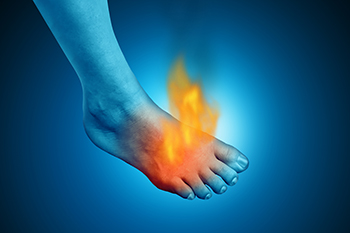
Experiencing a burning sensation in your feet while running can be painful and disrupt your fitness routine. This common issue can arise from overuse of foot muscles, iwearing mproper footwear, and friction. Running on hot surfaces and excessive sweating are other factors for burning feet. Overworking your foot muscles without adequate rest can lead to fatigue and a burning sensation. Friction from poorly fitting shoes or socks can irritate the skin while running on hot surfaces can directly cause a burning feeling. Excessive sweating creates a moist environment that can irritate the skin further. Addressing these issues through wearing proper footwear, moisture-wicking socks, and adequate rest can help alleviate symptoms. However, if the burning persists, it might indicate a more serious underlying condition such as nerve damage, diabetes, or hypothyroidism. If your feet feel like your feet are burning during a run, it is suggested that you schedule an appointment with a podiatrist.
Exercising your feet regularly with the proper foot wear is a great way to prevent injuries. If you have any concerns about your feet, contact one of our podiatrists of North Penn Podiatry. Our doctors will treat your foot and ankle needs.
How to Prevent Running Injuries
Many common running injuries are caused by overuse and overtraining. When the back of the kneecap starts wearing out and starts causing pain in your knee, this is commonly referred to as runner’s knee. Runner’s knee is a decrease in strength in your quadriceps and can occur if you’re not wearing properly fitted or supporting shoes. To prevent runner’s knee, focusing on hip strengthening is a good idea, as well as strengthening your quads to keep the kneecaps aligned.
What Are Some Causes of Running Injuries?
- One cause of a common running injury is called iliotibial band syndrome.
- Plantar fasciitis is also another common injury.
- Stress fractures can occur from overtraining, lack of calcium, or even your running style.
Best Ways to Prevent Running Injuries
- Wear footwear that fits properly and suits your running needs.
- Running shoes are the only protective gear that runners have to safeguard them from injury.
- Make a training schedule. Adding strengthening exercises as well as regular stretching can help keep you strong and limber and can lessen the possibility of injuries.
- Stretching keeps muscles limber; this will help you gain better flexibility.
If you have any questions please feel free to contact our offices located in Lansdale, and King of Prussia, PA . We offer the newest diagnostic and treatment technologies for all your foot and ankle needs.
Risks for and Causes of Ankle Sprains in Volleyball
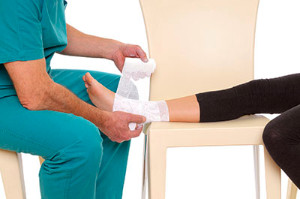
Ankle sprains are a frequent injury in volleyball, often resulting from various risk factors and causes. The sport’s fast-paced nature involves quick lateral movements, jumps, and landings, which can easily lead to rolled or twisted ankles. Uneven landings after jumps are a primary cause, especially when players descend on another’s foot. Inadequate warm-ups and poor ankle strength increase the risk, as muscles and ligaments are less prepared for sudden movements. Playing on an uneven or slippery surface can also contribute to instability and potential sprains. Additionally, wearing inappropriate footwear that lacks proper support or traction further heightens the risk. If you have endured a sprained ankle while playing volleyball, it is suggested that you contact a podiatrist who can effectively treat this condition.
Ankle and foot injuries are common among athletes and in many sports. They can be caused by several problems and may be potentially serious. If you are feeling pain or think you were injured in a sporting event or when exercising, consult with one of our podiatrists from North Penn Podiatry. Our doctors will assess your condition and provide you with quality foot and ankle treatment.
Common Injuries
The most common injuries that occur in sporting activities include:
- Achilles Tendonitis
- Achilles Tendon Rupture
- Ankle Sprains
- Broken Foot
- Plantar Fasciitis
- Stress Fractures
- Turf Toe
Symptoms
Symptoms vary depending upon the injury and in some cases, there may be no symptoms at all. However, in most cases, some form of symptom is experienced. Pain, aching, burning, bruising, tenderness, tightness or stiffness, sensation loss, difficulty moving, and swelling are the most common symptoms.
Treatment
Just as symptoms vary depending upon the injury, so do treatment options. A common treatment method is known as the RICE method. This method involves rest, applying ice, compression and elevating the afflicted foot or ankle. If the injury appears to be more serious, surgery might be required, such as arthroscopic or reconstructive surgery. Lastly, rehabilitation or therapy might be needed to gain full functionality in the afflicted area. Any discomfort experienced by an athlete must be evaluated by a licensed, reputable medical professional.
If you have any questions, please feel free to contact our offices located in Lansdale, and King of Prussia, PA . We offer the newest diagnostic and treatment technologies for all your foot care needs.
Reminder: When Was the Last Time...?
Causes of Pain on the Bottom of the Foot
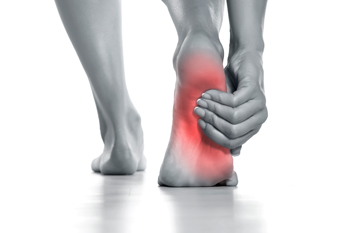
Pain on the bottom of the foot can arise from various conditions, impacting daily activities and overall well-being. Plantar fasciitis is characterized by inflammation of the plantar fascia, a thick band of tissue connecting the heel to the toes. This condition often results in stabbing pain near the heel, especially in the morning. Another cause is metatarsalgia, where the ball of the foot becomes inflamed, leading to pain and discomfort during walking or running. Neuromas, particularly Morton’s neuroma, involve nerve inflammation between the toes, causing sharp, burning pain. Flat feet or fallen arches can lead to overpronation, straining the foot muscles and ligaments. Overuse injuries from excessive physical activity, wearing improper footwear, and obesity also contribute to bottom of the foot pain. Conditions like arthritis or diabetic neuropathy can worsen discomfort. Identifying the specific cause of foot pain is vital for effective treatment and maintaining foot health, ensuring mobility and comfort. If you have pain in this part of your foot, it is strongly suggested that you consult a podiatrist who can determine the cause and offer appropriate treatment solutions.
Foot Pain
Foot pain can be extremely painful and debilitating. If you have a foot pain, consult with one of our podiatrists from North Penn Podiatry. Our doctors will assess your condition and provide you with quality foot and ankle treatment.
Causes
Foot pain is a very broad condition that could be caused by one or more ailments. The most common include:
- Bunions
- Hammertoes
- Plantar Fasciitis
- Bone Spurs
- Corns
- Tarsal Tunnel Syndrome
- Ingrown Toenails
- Arthritis (such as Gout, Rheumatoid, and Osteoarthritis)
- Flat Feet
- Injury (from stress fractures, broken toe, foot, ankle, Achilles tendon ruptures, and sprains)
- And more
Diagnosis
To figure out the cause of foot pain, podiatrists utilize several different methods. This can range from simple visual inspections and sensation tests to X-rays and MRI scans. Prior medical history, family medical history, and any recent physical traumatic events will all be taken into consideration for a proper diagnosis.
Treatment
Treatment depends upon the cause of the foot pain. Whether it is resting, staying off the foot, or having surgery; podiatrists have a number of treatment options available for foot pain.
If you have any questions, please feel free to contact our offices located in Lansdale, and King of Prussia, PA . We offer the newest diagnostic and treatment technologies for all your foot care needs.
Foot Conditions That May be Linked to Thyroid Disease
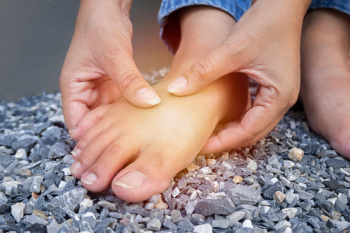 Thyroid disease can lead to various foot conditions that impact daily comfort and mobility. Cracked heels are a common issue, resulting from dry skin associated with an underactive thyroid. Itchy feet may also occur due to the same dryness and reduced circulation. Cold feet are another symptom, as thyroid disorders often lead to poor blood flow. Swelling in the feet and ankles can arise from fluid retention linked to thyroid imbalance. Additionally, foot cramps are frequent due to disrupted electrolyte balance and nerve function. These symptoms highlight the need for thyroid management and regular foot care. Moisturizing regularly, wearing supportive footwear, and monitoring foot health can alleviate discomfort. If you suffer from a thyroid disorder and have problematic foot conditions, it is suggested that you consult a podiatrist who can offer you effective relief and treatment options.
Thyroid disease can lead to various foot conditions that impact daily comfort and mobility. Cracked heels are a common issue, resulting from dry skin associated with an underactive thyroid. Itchy feet may also occur due to the same dryness and reduced circulation. Cold feet are another symptom, as thyroid disorders often lead to poor blood flow. Swelling in the feet and ankles can arise from fluid retention linked to thyroid imbalance. Additionally, foot cramps are frequent due to disrupted electrolyte balance and nerve function. These symptoms highlight the need for thyroid management and regular foot care. Moisturizing regularly, wearing supportive footwear, and monitoring foot health can alleviate discomfort. If you suffer from a thyroid disorder and have problematic foot conditions, it is suggested that you consult a podiatrist who can offer you effective relief and treatment options.
When dealing with systemic disease of the feet, it is extremely important to check the affected areas routinely so that any additional problems are caught quickly. If you have any concerns about your feet and ankles contact one of our podiatrists from North Penn Podiatry. Our doctors will assist you with all of your podiatric needs.
Systemic Diseases of the Feet
Systemic diseases affect the whole body, and symptoms usually are displayed in the feet. This condition can make a patient’s ability to walk unbearable. Systemic diseases include gout, diabetes mellitus, neurological disorders, and arthritis.
Gout – is caused by an excess of uric acid in the body. Common symptoms include pain, inflammation, and redness at the metatarsal/phalangeal joint of the base big toe. Gout can be treated by NSAIDs to relieve pain and inflammation, and other drugs that lower the acid levels in the body.
Diabetes mellitus – is an increase in the level of blood sugar that the body cannot counteract with its own insulin. Failure to produce enough insulin is a factor in Diabetes.
Diabetes of the Feet
Diabetic Neuropathy – may lead to damaged nerves and affect the feet through numbness and loss of sensation.
Peripheral Vascular Disease – can restrict the blood flow to the feet, and often times lead to amputation of the feet.
If you have any questions please feel free to contact our offices located in Lansdale, and King of Prussia, PA . We offer the newest diagnostic and treatment technologies for all your foot and ankle needs.
Managing Foot Health for Diabetic Patients
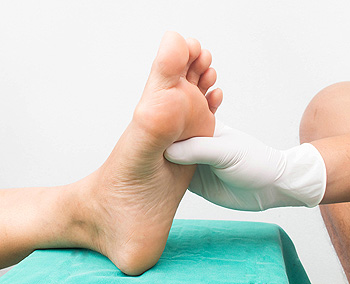
Diabetic patients face several risk factors that can impact foot health, including poor circulation and high blood sugar levels that can lead to nerve damage. Preventing nerve damage involves maintaining good blood sugar control through a balanced diet, regular exercise, and prescribed medications. Regular foot care is essential for diabetic patients to prevent complications. Daily inspections of the feet for cuts, blisters, or any signs of infection are crucial. Keeping the feet clean and moisturized helps prevent dryness and cracking. Wearing properly fitted shoes reduces the risk of pressure sores and injuries. Additionally, regular check-ups with a podiatrist ensures early detection and treatment of any foot issues. If you have diabetes, it is strongly suggested that you are under the care of this foot doctor who can help you to manage this condition.
Diabetic foot care is important in preventing foot ailments such as ulcers. If you are suffering from diabetes or have any other concerns about your feet, contact one of our podiatrists from North Penn Podiatry. Our doctors can provide the care you need to keep you pain-free and on your feet.
Diabetic Foot Care
Diabetes affects millions of people every year. The condition can damage blood vessels in many parts of the body, especially the feet. Because of this, taking care of your feet is essential if you have diabetes, and having a podiatrist help monitor your foot health is highly recommended.
The Importance of Caring for Your Feet
- Routinely inspect your feet for bruises or sores.
- Wear socks that fit your feet comfortably.
- Wear comfortable shoes that provide adequate support.
Patients with diabetes should have their doctor monitor their blood levels, as blood sugar levels play such a huge role in diabetic care. Monitoring these levels on a regular basis is highly advised.
It is always best to inform your healthcare professional of any concerns you may have regarding your feet, especially for diabetic patients. Early treatment and routine foot examinations are keys to maintaining proper health, especially because severe complications can arise if proper treatment is not applied.
If you have any questions please feel free to contact our offices located in Lansdale, and King of Prussia, PA . We offer the newest diagnostic and treatment technologies for all your foot and ankle needs.

